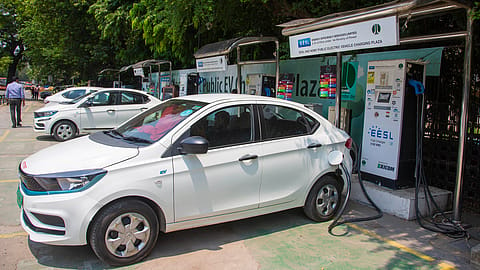EVs to account for 12-15% of India's total car sales by 2030: Moody’s
Moody’s forecasts car sales in India to grow at a CAGR of 3.5% to about 5.1 million units by 2030, with sport utility vehicles (SUVs) accounting for two-thirds of total volumes.

Electric vehicles will account for 12%-15% of total car sales in India by the end of the decade, falling short of the government's 30% target by 2030, according to Moody’s Ratings.
The electrification of India's auto market is in its early stages, with penetration rates of below 2%. The EV adoption rate in the country is also low compared to markets that are more advanced in electrification like China, Europe and the US, reflecting limited charging infrastructure, higher upfront costs and consumer hesitancy, said Moody’s.
“We expect the CAGR for India's BEV sales through 2030 to be among the highest in Asia. However, India's BEV sales will still be substantially dwarfed by China's large BEV market,” it said.
Moody’s forecasts car sales in India to grow at a compound annual growth rate of 3.5%, the highest growth rate in Asia, to about 5.1 million units by 2030, with sport utility vehicles (SUVs) accounting for two-thirds of total volumes. “The proportion of entry-level cars (mini and small cars) plummeted to around 30% of total car sales in 2024 from 75% in 2010. Meanwhile, the share of sport utility vehicles (SUVs) and crossover vehicles surged to 54% from a mere 5% in the same period, and we estimate this will likely rise to the two-thirds mark by 2030,” said Moody’s.
A low car penetration rate of only 44 cars per 1,000 people highlights the significant growth potential of the world's third-largest auto market by volumes, said Moody’s.
India’s passenger car market is competitive with the presence of local and foreign automakers. Domestic companies account for about a quarter of car sales. They face stiff competition from Japanese, Korean and Chinese companies, which operate in India through joint ventures and subsidiaries, and together account for more than 70% of the market.
Indian carmakers more than doubled their market share over the last 10 years, according to Euromonitor data, as they revitalised model offerings to cater to evolving customer preferences. In 2015, Indian carmakers – Tata Motors and Mahindra & Mahindra (M&M) – held a modest 11% share of the market. Their combined share grew to 24% in 2024.
Recommended Stories
Other market gainers include Korea's Hyundai Motor Company and its associate Kia Corporation), collectively Hyundai Motor Group, which increased its combined market share to 20% in 2024 from 18% in 2015. Meanwhile, Japanese automakers have lost share in India after dominating the market for years. The collective share of Japanese carmakers that operate in India through subsidiaries and joint ventures – Honda Motor Co., Nissan Motor Co., Suzuki Motor Corporation and Toyota Motor Corporation – fell to 51% in 2024 from 61% in 2015.
Although Japanese brands like Toyota and Suzuki have lost market share, in a growing market, their sales volumes in India have actually increased over time. And while Indian carmakers have climbed in terms of sales rank, they have not shaken the market leader, Maruti Suzuki, which retains the top spot with a share of 42% in 2024, though that is down from 46% in 2015.
During 2015 to 2024, India's share of global sales doubled for Toyota and Hyundai Motor Group: to 4% from 2% for Toyota, and to 16% from 8% for Hyundai Motor Group. Suzuki's proportion of India sales increased to 64% from 53% in the same period. However, Honda's car sales in India have declined much more steeply over the past decade than its overall global car sales.
Moody’s said India will remain a key player for global carmakers as they focus on electrification of their product portfolios to meet stringent emission targets in China, Europe and the US. “Low sales volumes and the cost of batteries will keep the profitability of EVs relatively low in most markets, requiring global carmakers to remain focused on the sale of conventional vehicles in high-growth markets like India, even as they look to increase EV sales in other markets,” the ratings agency said.
(INR CR)


